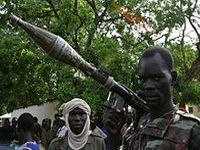Africa's educational crisis: Another gap to be bridged
The impact of the crisis in the Central African Republic has had a devastating effect upon the country's schoolchildren. According to UNICEF, 70% of primary school children are not attending classes because of insecurity, part of a wider and shocking picture of education in Africa in a world which spends nearly 2 trillion USD on weapons every year.

In eleven out of the country's seventeen provinces, or prefectures, 65 per cent of schools have been looted, vandalized or wholly or partially destroyed in fighting. Half of the country's schools are closed and eighty per cent of the pupils state that they are frightened to turn up for classes - if indeed they have a teacher, equipment or books.
Coupled with the non-delivery of the school programme is the risk that more and more school pupils will drop out of the system, since the quality of the teaching, as well as access to the schools, is affected and when they arrive there, accommodation is deficient.
In December 2012 fighting flared up after several years of unrest when the Séléka coalition launched attacks against the government forces of President François Bozizé, who fled when the capital, Bangui, was attacked in March 2014. Attempts by the Prime Minister, Nicolas Tiangaye, to restore law and order suffered a setback in August with a new wave of violence.
The result is that the entire population of some 4.6 million people is directly or indirectly affected, and the average schoolchild has lost six months of schooling. UNICEF states that catch-up classes are cramming 25,000 children for this year's exams, while school materials have been delivered to a further 20,000 children and efforts are being made to get 105,000 children back to school as soon as possible.
As usual, funding requested by the agency has fallen far short of the 32 million dollars needed - only one third of this has been received, in a world where one point seven thousand billion USD are spent yearly on selling weapons systems to kill people.
Wider issue
The problem in the Central African Republic is part of a wider issue affecting schoolchildren in some parts of Africa, where of 128 million children of school age, some 17 million will never go to school, and a further 37 million will learn next to nothing while there, according to the Africa Learning Barometer, an instrument set up by Brookings' Center for Universal Education.
Of 28 countries studied in sub-Saharan Africa, 40 per cent or over of school-age children fail to attain a minimum level of learning by grade 5 in seven of these countries, the worst examples being Ethiopia, Nigeria and Zambia where according to the study half of the children do not learn basic skills such as reading, writing and arithmetic by the time they have finished primary school, rendering them totally unprepared for the delivery of the rest of the school curriculum.
The conclusion reached by the Barometer shows that in sub-Saharan Africa, half of the total primary school universe (61 million children) will not have the skills they need to lead integrated and productive lives by the time they end primary school.
And again, as usual, the ones most affected are from the poorer, rural areas, where mechanisms have not been set up to create inclusion programmes and where there exists a massive cultural and developmental gap, educational and digital exclusion which renders people unable to compete on equal terms with their peers in wealthier areas of their own countries or of the world in general.
How telling it is that the one person trying to address this question on a continental scale in Africa, Muammar al-Qathafi, was removed by the FUKUS Axis - France, the UK and US.
The effects of what amounts to a humanitarian catastrophe will be felt for decades to come, since social exclusion and marginalization are the likely destination for tens of millions of children. It beggars belief to state that in 2013 this is the world we live in, but it is true.
Photo: Wikipedia
Timothy Bancroft-Hinchey
Pravda.Ru
Subscribe to Pravda.Ru Telegram channel, Facebook, RSS!


